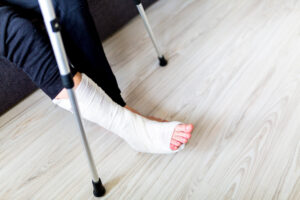Have you experienced substandard orthopaedic treatment from a healthcare professional? Did you suffer harm as a result? If the answer is yes, please read our helpful guide and learn how you could receive compensation for orthopaedic negligence.
In this guide, we will aim to provide you with all the information you will need in order to make an orthopaedic negligence claim. Firstly, we discuss the eligibility criteria you will need to fulfil, as well as exploring the potential compensation payouts you could receive. Moreover, we look at the definition of orthopaedic surgery and discuss common situations where negligence could occur.
Furthermore, we explore the time limits of making a medical negligence claim. We also look at the different types of evidence you could provide, such as medical reports and X-rays. Lastly, we discuss how a No Win No Fee solicitor from our panel could help you make your claim.
At Medical Negligence Claims Care, our advisors work meticulously around the clock to answer any questions you may have. As part of the free services we offer, you could also receive an eligibility assessment to decipher the strength of your claim. Please get in touch by:
- Calling us on 0113 460 1216
- Contact us by filling out our online form
- Use our free live chat feature

Frequently Asked Questions
- Am I Able To Make An Orthopaedic Negligence Claim?
- The Average Orthopaedic Claims Compensation Amounts
- What Is Meant By Orthopaedics?
- The Common Reasons For Making An Orthopaedic Negligence Claim
- Is There A Time Limit For Orthopaedic Negligence Claims
- What Evidence Will I Need To Prove Orthopaedic Medical Negligence?
- No Win No Fee Orthopaedic Compensation Claims
- More Information
Am I Able To Make An Orthopaedic Negligence Claim?
Yes, you could make an orthopaedic negligence claim, provided that you meet the eligibility requirements. In essence, the following criteria must be fulfilled:
- You were owed a duty of care
- A healthcare professional breached this duty of care
- You suffered avoidable harm as a result
All healthcare professionals owe a duty of care to their patients to provide the minimum expected standard of care. For instance, healthcare professionals should provide patients with the correct medical advice and order further tests where necessary as part of their duty. A failure to uphold this duty of care may therefore result in avoidable harm to patients.
Consequently, if you’ve experienced orthopaedic negligence as a result of substandard care, you could be eligible to claim. To find out more about your eligibility, please contact one of our friendly advisors today.
The Average Orthopaedic Claims Compensation Amounts
If your orthopaedic negligence claim is successful, you could be entitled to a compensation payout. Part of your settlement could include general damages, which aim to compensate you for the pain and suffering you endured as a result of the negligence.
The Judicial College Guidelines (JCG) are commonly used by lawyers when assigning values to different types of harm. Ultimately, the JCG provides suggestive compensation guidelines for many types of harm at various severities.
All entries in the table below, aside from the first entry, have been taken from the JCG for common types of harm caused by orthopaedic negligence. Please be advised that the figures below are merely guidelines and do not guarantee how much compensation you will receive.
| Harm | Notes | Compensation Guideline |
|---|---|---|
| Multiple severe injuries and special damages | More than one severe forms of harm with special damages such as loss of earnings | Up to £500,000+ |
| Paraplegia | The level of award will depend on factors such as the degree of independence and the age and life expectancy | £267,340 to £346,890 |
| Severe Back Injuries (i) | Cases with the most severe injuries such as damage to the spinal cord and nerve roots, leading to severe pain and disabilities. | £111,150 to £196,450 |
| Severe Back Injuries (ii) | Cases with have special features such as nerve root damage with associated loss of sensation, and an impaired bladder function. | £90,510 to £107,910 |
| Severe Neck Injuries (ii) | Cases involving serious fractures to the discs in the cervical spine, causing serious disabilities and a substantial loss of movement in the neck. | £80,240 to £159,770 |
| Severe Neck Injuries (iii) | Harm including dislocations or severe damage to soft tissues or ruptured tendons, leading to chronic conditions | £55,500 to £68,330 |
| Severe Pelvis And Hip Injuries (iii) | These cases may include fractures of the acetabulum, causing degenerative changes and leg instability with the requirement of hip replacement surgery in the future, | £47,810 to £64,070 |
| Moderate Pelvis And Hip Injuries (i) | Significant harm to the hip or to the pelvis but any permanent disability is not major. | £32,450 to £47,810 |
| Less Severe Arm Injury | While there will have been substantial disabilities, a great degree of recovery will have occurred. | £23,430 to £47,810 |
| Wrist Injuries c) | Harm resulting in some permanent disability such as a degree of persisting pain and stiffness. | £15,370 to £29,900 |
To discuss how much compensation you could receive for your unique situation, please contact our team today.
How Compensation For Orthopaedic Negligence Is Calculated
Your compensation payout could include both general and special damages as part of your settlement. Special damages will ultimately compensate you for any financial losses you suffered due to the harm you experienced. To illustrate, you could have paid out-of-pocket expenses for long-term physiotherapy sessions and travel costs due to the harm you suffered.
Special damages could also include:
- Loss of earnings
- Home modification costs
- Medical expenses
- Travel costs
- Childcare costs
Moreover, it’s essential that special damages must be evidenced in order to include them in your claim. Evidence could be supplied in the following forms:
- Payslips
- Receipts
- Invoices
- Bank statements
To learn more about what special damages you could include in your claim, please contact one of our helpful advisors.
What Is Meant By Orthopaedics?
Orthopaedics, which is also known as orthopaedic surgery, is a medical specialty that focuses on the skeletal system and its interconnecting parts. Body parts within the musculoskeletal system include:
- Bones
- Joints
- Ligaments
- Tendons
- Muscles
- Nerves
Notwithstanding, orthopaedic doctors work to diagnose and treat injuries that may be age-related, from birth, or from activity. Orthopaedics may treat:
- Bone fractures
- Soft tissue injuries
- Neck and back pain
- Arthritis pain
To find out if you could make a claim after receiving substandard orthopaedic care, please contact our advisory team today.

The Common Reasons For Making An Orthopaedic Negligence Claim
There are many instances where orthopaedic negligence could occur due to substandard treatment. Therefore, please see the following examples and how an orthopaedic negligence claim could arise as a result.
Claiming For A Delayed Diagnosis
A healthcare professional could fail to notice symptoms of a fracture, resulting in a delayed diagnosis. For example, a doctor could conduct an inadequate physical examination and could fail to refer you for a scan. As a result, a doctor could also misdiagnose your leg fracture as muscular pain, causing further damage to your leg injury. Consequently, you could develop a more serious injury, as well as psychological harm such as PTSD and depression.
Therefore, if you’ve experienced harm from a medical misdiagnosis, you could be entitled to make an orthopaedic negligence claim.
Orthopaedic Surgery Claims
An orthopaedic surgeon could make a surgical error during an operation, resulting in an unnecessary surgery .For example, a surgeon could:
- Use an incorrect implant used for a replacement knee surgery. As a result, the patient would require further surgeries to correct the mistake, causing stress and anxiety.
- Leave a retained foreign object inside the body during surgery. For example, a surgeon could accidentally leave a speculum inside a patient, causing severe pain and damage to the surrounding organs and nerves.
Therefore, if you’ve suffered harm as a result of an orthopaedic surgical error, you could make a surgical negligence claim.
Compensation For Inadequate Post-Operative Care
You could also experience poor post-operative care after an orthopaedic surgery, causing unnecessary harm. For instance, a nurse could fail to monitor any post-operative symptoms and could fail to clean the surgery site. As a result, the patient could develop infections and require even further treatment.
Therefore, if you’ve experienced harm from inadequate post-operative care after an orthopaedic surgery, you could make a hospital negligence claim. Please contact our helpful advisory team today to discuss your own personal situation.

Is There A Time Limit For Orthopaedic Negligence Claims
Yes, you will typically have up to 3 years to start your orthopaedic negligence claim. As set out by the Limitation Act 1980, the claims time limit runs from:
- The date that the medical negligence occurred or;
- The date of knowledge. This is the date that you realised the harm you’re suffering from was caused by substandard medical treatment.
Ultimately, there are two exceptions to the above time limit, such as:
- If the claimant is a child, they cannot claim independently. Therefore, once the claimant reaches the age of 18, they will have until their 21st birthday to start their claim.
- If the claimant is lacking in mental capacity, the time limit will be frozen indefinitely. If the claimant regains their mental capacity, they will have 3 years to make their claim.
In both these cases, a litigation friend could make a claim on their behalf while they are unable to make their own claim.
If you want to find out more about the claim time limits, please contact one of our friendly advisors today.
What Evidence Will I Need To Prove Orthopaedic Medical Negligence?
In order for your claim to be successful, it’s essential that you provide evidence to support the harm that you suffered. For instance, you could provide the following types of evidence:
- A copy of your medical records that detail the harm you experienced
- Scans, X-rays or test results
- Correspondence between yourself and the medical institution where you received the negligent treatment
- Contact details of anyone who witnessed the negligent treatment who could later support your version of events
- Photographs or videos of the harm that you suffered
All of this and any additional evidence you may need could be collected by a solicitor from our panel. Contact our advisors to see if you oculd be eleigible to work with one of them.
No Win No Fee Orthopaedic Compensation Claims
Our advisors are available 24 hours, 7 days a week to answer any questions you may have about making a claim. If it’s deemed that you have a strong claim, you could be connected with one of the experienced No Win No Fee solicitors from our panel. By operating under a Conditional Fee Agreement (CFA), you could enjoy the following benefits:
- You won’t be required to pay for any solicitor service fees if your claim is unsuccessful
- You won’t pay for any upfront or ongoing fees for your solicitor’s work
- If your claim is successful, you will only be required to pay a small success fee for your solicitor’s work. Please note that the success fee will be deducted from your compensation and the percentage amount is legally capped. Therefore, you will always be rewarded with the bulk of the compensation.
Moreover, if you’re connected with one of the solicitors from our panel, you could experience the following:
- Help with evidence-gathering such as medical reports and witness statements
- Regular case updates
- Explanations of key legal terminologies and help with signing documents
- Support with rehabilitation for the harm you experienced
- Negotiations with the third party in attempts to achieve a desired settlement
Please contact one of our friendly advisors to find out the full benefits of making a claim with Medical Negligence Claims Care.

Contact Medical Negligence Claims Care
To start your orthopaedic negligence claim, please get in touch with one of our experienced advisors today. Get in touch:
- Call us on 0113 460 1216
- Contact us by filling out our online form
- Use our free live chat feature
More Information
To learn more about medical negligence claims, please see some of our other guides:
- Learn how to claim for maternity negligence
- Get help with making a claim for ophthalmic negligence
- See the following advice on erbs palsy claims
Additional external resources:
- See the following advice about getting back to normal after an operation from the NHS
- Learn about sick leave and return to work from the Health and Safety Executive
- Get help with statutory leave and time off from Gov.Uk
Thank you for reading our helpful guide on how to claim for orthopaedic negligence.

